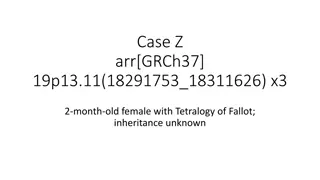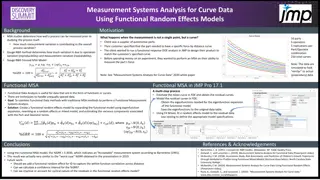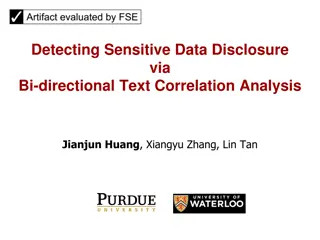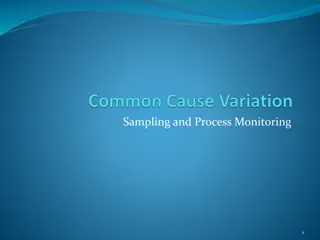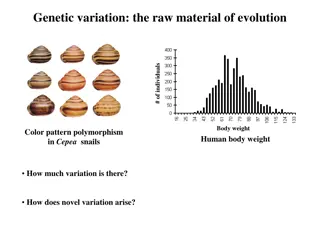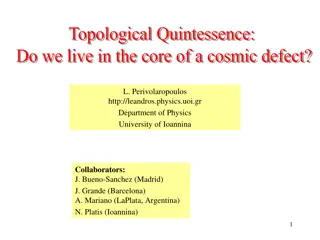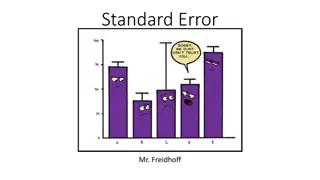Detecting Major Data Variation Directions
Principal Component Analysis (PCA) is effective in identifying significant variation directions in data, including population structures, cryptic relationships, and genotyping errors. Performing PCA involves processing genotype data, forming a relatedness matrix, and eigen-decomposing it to highlight variance-maximizing directions.
Download Presentation

Please find below an Image/Link to download the presentation.
The content on the website is provided AS IS for your information and personal use only. It may not be sold, licensed, or shared on other websites without obtaining consent from the author.If you encounter any issues during the download, it is possible that the publisher has removed the file from their server.
You are allowed to download the files provided on this website for personal or commercial use, subject to the condition that they are used lawfully. All files are the property of their respective owners.
The content on the website is provided AS IS for your information and personal use only. It may not be sold, licensed, or shared on other websites without obtaining consent from the author.
E N D
Presentation Transcript
Principal Appraisal - Special Character Jane Hahn principal@goodshepherd.school.nz GOOD SHEPHERD SCHOOL, BALMORAL, AUCKLAND T Together we L Learn and C Care
Purpose of the Catholic School Catholic education is above all a question of communicating Christ, of helping to form Christ in the lives of others. St. Pope John Paul 11 quoted in The Catholic Education of School-Age Children First and foremost every Catholic educational institution is a place to encounter the living God who in Jesus Christ reveals his transforming love and truth. Pope Benedict XV1 quoted in The Catholic Education of School-Age Children
Purpose of the Catholic School (contd) The Declaration of the proprietors of Catholic schools in New Zealand on the essential characteristics of authentic Catholic school education: Catholic schools provide Catholic education Catholic schools strive for educational excellence Catholic schools contribute to the Church s mission
Purpose of the Catholic School (contd) The Philosophy of Catholic Schools in New Zealand Among the guiding characteristics that are fundamental to Catholic schools: 1. The development of the spiritual, intellectual, moral, emotional, physical and social dimensions of pupils/students, since authentic human life and openness to God are inseparable 2. The search for excellence, an integral part of the Christian message
Purpose of principal appraisal in a Catholic school Professional Growth - through inquiry into practice and goal setting in the dimensions of improving teacher practice and student outcomes, and in developing and strengthening the Catholic special character of the school Accountability - by providing evidence that you are meeting the Professional Standards for Principals, the Standards for the Teaching Profession and the Catholic School Elaborations for the Standards for the Teaching Profession
What should appraisal of the principal in a Catholic school consist of? Performance Agreement - including the principal s goals for the year and agreed indicators of success Review of principal s performance in relation to the Professional Standards for Principals, the Standards for the Teaching Profession and the Catholic School Elaborations for the Standards for the Teaching Profession Coherence is important in the setting up of a principal s appraisal (see example of tool used to align Standards for the Teaching Profession, Professional Standards, T taiako and Catholic School Elaborations for the Standards for the Teaching Profession)
PROFESSIONAL STANDARDS (Primary: Experienced Teacher) FURTHER STANDARD FOR TEACHING PROFESSION ELABORATIONS OF THE STANDARD ELABORATIONS FOR CATHOLIC SCHOOLS REFLECTION TE TIRITI O WAITANGI PARTNERSHIP Understand and recognise the unique status of tangata whenua in Aotearoa New Zealand. - Demonstrate their commitment to their own ongoing learning Teachers in Catholic schools understand and are committed to the New Zealand Catholic Bishops Conference understanding of Te Tiriti o Waitangi and the commitment of the Catholic Church to bi-culturalism. Demonstrate commitment to tangata whenuatanga and Te Tiriti o Waitangi partnership in Aotearoa New Zealand. - Demonstrate highly effective communication skills when interacting with students, colleagues and families/wh nau Understand and acknowledge the histories, heritages, languages and cultures of partners to Te Tiriti o Waitangi. Links to T taiako key competency: Tangata Whenuatanga Practise and develop the use of te reo and tikanga M ori. Teachers in Catholic schools deepen their understanding of M ori spirituality and incorporate it into their teaching of Religious Education and spirituality.
Setting personal goals/inquiries into practice as a principal in a Catholic school Goals/inquiries are established at the beginning of the principal appraisal process In a Catholic school, one goal/inquiry would focus on Catholic special character Appraiser and appraisee would agree on time frames, indicators of success, sources of evidence and what support might be required, and document this action plan A rich inquiry would lend itself to collecting evidence that the principal is meeting many of the Professional Standards for Principals, the Standards for the Profession and the Catholic School Elaborations for the Standards for the Teaching Profession
Possible focus areas for a personal inquiry for a principal of a Catholic school Planning and implementing an effective internal review based on the Catholic Special Character Review for Development: Revised Draft Process document Recommendations from an external Catholic Special Character review Recommendations from the previous year s internal Catholic special character review In best practice, goals are linked to school s strategic goals and annual plan
Professional Standards: Systems, Culture, Pedagogy Goal 3:By the end of the year I have developed the Good Shepherd environment (physically and emotionally) so that the school strongly reflects its Catholic Special Character in a culturally responsive and diverse manner Basis of priority Planned Priorities Action Needed Appraisal Data/ Portfolio evidence Support the staff to achieve their own aspect of this goal Importance of Special Character in the school The importance of this goal was identified as part of our internal review of Catholic special character in 2014. It became an integral part of our appraisal system, with many teachers and leaders identifying it as a personal development goal for 2015 (see Sarah Appraisal Special Character Goal for 2015 and Melissa Down R.E. Goal for 2015). Great progress was made in this area throughout the year, with many discussions at team meetings facilitating collaboration (see Sheridan team meeting minutes 2015 and Connolly team meeting minutes 2015). Open office space in a physical sense Feedback from the last internal review - regarding the cultural diversity representation in the school The second way this goal was approached was by setting up a Foyer Planning Group, comprised of representatives from all sections of the school community. Two students were nominated from the School Council at the end of 2014 to be part of the group, the board and PTA were both approached to nominate interested members and teachers were asked to put their names forward to be part of the planning group. The group met regularly (see minutes 9 March and 5 June as examples). The group researched the options and decided on a stained glass window of Jesus, the Good Shepherd as the appropriate fixture to reflect our Catholic special character and our own unique charism (see Image 3332). The process culminated in a blessing and dedication ceremony on the last day of school 2015 to which all members of the school community were invited (see Blessing of Stained Glass Window Programme). Working with the leadership team to access information that will support this development Expand the partnership with the parents and students to develop understanding of faith across all cultures represented in the school Summary: We made progress across the school on this goal, which was also identified by many teachers as a personal development goal. This is an ongoing focus, however, and will need to become area that we are constantly monitoring. This has been discussed and has been incorporated into the Quality Assurance tool so that it remains to the fore.
Development Objectives 2018 Links to Professional Standards, Standards for Teaching Profession, Catholic School Elaborations for the Standards for the Teaching Profession, Career Structure Objectives Linked to charter targets and individual needs Indicators/Tasks What will happen throughout the year to make this happen? Evidence What evidence will occur throughout the year to show progress and achievement? Outcomes What will this look like when achieved? What will be the impacts on learners? Meet with DRS and DP before meeting of board special character review team Planning documents An effective internal review for development Objective 1: Professional Inquiry Would it increase the capacity of leaders in our school to effectively review for development if I supported the DRS and DP to design and develop a review plan based on the internal review template? Professional Standard Dimensions: Culture - Pedagogy - Systems Career Structure Criteria Meeting requirements of performance review STP and Catholic School elaborations: Professional learning - Professional relationships - Learning focused culture - Teaching Feedback from DRS and DP Observations and feedback to DRS and DP after meetings and throughout review process. Observations and feedback Feedback on the review by the proprietor Appraisal Data/ Portfolio Evidence:
Who should appraise the principal of a Catholic school? Use of an external appraiser did not necessarily result in a robust appraisal. ERO. (2014). Supporting school improvement through effective principal appraisal. Principal appraisal is usually delegated to the board chair or an external appraiser. Both of these choices can provide an effective appraisal if a rigorous, improvement-focused process is followed (see above document for guidelines on appraisal practices associated with improvement). Having an appraiser who is Catholic and familiar with the Catholic education system is an advantage to the principal of a Catholic school.
Documents that support principal appraisal Professional Standards for Primary Principals - Primary Principals Collective Agreement 2016 - 2018 Our Code, Our Standards - Education Council New Zealand Catholic School Elaborations for the Standards for the Teaching Profession - NZCEO Supporting school improvement through effective principal appraisal - ERO School s Principal s Performance Appraisal Policy School s strategic and annual plan Catholic Special Character Review for Development: Revised Draft Process - Primary Principals Career Structure - Primary Principals Collective Agreement 2016 - 2018







